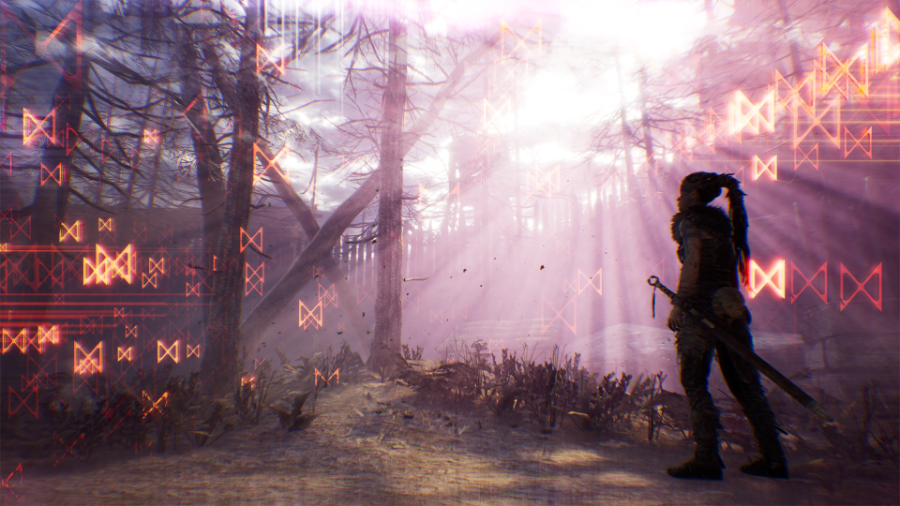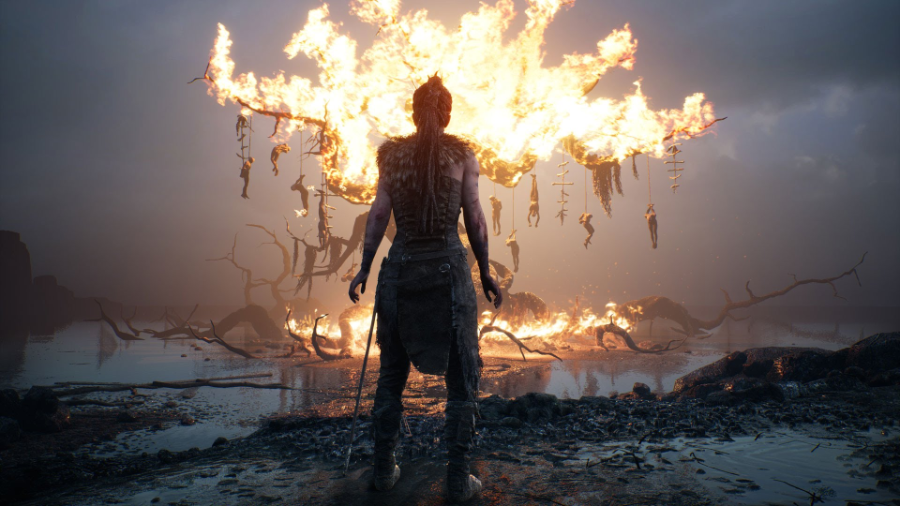I'm not totally sure if this game will be for me, but your glowing review of it certainly makes me interested in giving it a shot at some point. I will keep an eye out for a sale and give it a go when it's a bit cheaper.
Hellblade: Senua's Sacrifice Review
|
|
See PixlBit's Review Policies

On 08/20/2017 at 12:00 PM by Julian Titus You should play this. |

People who appreciate well written characters and excellent stories will find a lot here to love. As important a game as it is haunting and beautiful.
When Hellblade: Senua’s Sacrifice was unveiled at E3 in 2015, I had certain expectations. As the next game from developer Ninja Theory, I naturally assumed that it would be a stylish character action game replete with skill trees, flashy combos, Quick Time Events, and mind-boggling performance capture work. What Senua’s Sacrifice actually is took me completely by surprise and, while it is nowhere near the game I was expecting, it is something truly special.
Hellblade tells the story of Senua, a Celtic warrior of the Pict tribe. After befriending a fellow Celt named Druth who had been enslaved by Norse Vikings, Senua learns all about the gods of the Northmen. When her lover Dillion is cruelly executed, she decides to venture into Helheim to treat with Hela, the goddess of death, and bring her love back. On its face, this is a typical video game setting, but there’s one thing that sets the premise of Hellblade apart from most titles:
Senua suffers from psychosis.
This isn’t some excuse to do trippy “insanity effects” or make the gameplay more exciting; Senua’s mental illness is at the heart of Hellblade’s story, and permeates every fiber of her character. Senua has nearly a dozen different voices in her head, speaking to her almost constantly. They vary in tone and personality, with some voices cheering her on and others viciously berating her and tearing her down. While I don’t suffer from mental illness, I found myself able to sympathize with Senua’s condition, and empathize with her feelings of guilt and grief. As the player, you occupy a space in her mind, and this is a dangerous place to be. It also calls into question everything you see and hear in the game. Is Senua really on a fantastical quest into the bowels of Helheim, squaring off against undead warriors and gods like Surtr? Or is this all in her mind as she chases windmills like Don Quixote did? The game is purposely vague in this regard, and the conclusions you come to will likely keep you thinking for days after putting the controller down.
The portrayal of Senua’s psychosis is achieved through some stunning voice work and sound design. The voices in her head were recorded binaurally, and the game suggests that you play with headphones on, which I wholeheartedly echo. With headphones, the voices come at you from all angles, sometimes whispering, sometimes yelling, ever present. Instead of making Senua seem weak, it made me appreciate her as one of the toughest video game characters I’ve ever seen; fighting enemies within even as she combats hellish opponents face to face.
Combat plays a part in Hellblade, but not nearly as large a roll as you would expect from the developers of Heavenly Sword and DMC: Devil May Cry. Senua ends the game with the same skills she begins with; you won’t be unlocking new moves or upgrading your weapons and armor. Senua can only attack one enemy at a time, even though multiple enemies can engage her. This requires constant management of the battlefield, as enemies love to surround Senua, and things can get extremely tense and hectic during the latter half of the game. The combat may not satisfy action junkies looking for the next big God of War game, but with combat only taking up about 20% of the 7-9-hour adventure, every battle carries weight, and Senua seems to put everything she has into each swing of her sword. I’ve never felt so immersed in a game’s combat before, and that is absolutely due to the way Senua is established as a character.
This character establishment is achieved through the incredible performance of Melina Juergens, whose every facial expression, movement, and sound were captured perfectly. Ninja Theory has always pushed the boundaries of performance capture, but Hellblade takes things to the next level. This is one of the most impressive graphical accomplishments of the generation, and it is rare for Senua to step into that dreaded “uncanny valley”. From the striking intro to the bitter end, I believed in Senua thanks to the perfect melding of performance, graphics, and gameplay.
The gameplay, however, may not be for everyone. As stated before, combat encounters are few and far between. The bulk of Senua’s Sacrifice involves puzzle solving and light exploration. Puzzles basically come in three flavors, and while that could seem repetitive, each puzzle played with the formula just enough to keep things interesting for me. Some of the solutions are downright brilliant, and play in to Senua’s mental illness to further establish her character. There are also Nordic runes to find that teach a fair amount of Norse mythology, and I was truly sad that I missed a few since they were so interesting.
I would have liked the opportunity to explore more of the world in Hellblade, but it is a largely linear game. That may sound like a condemnation in this era of 80-hour open world games, but it is refreshing to see a game with a singular vision and a story to tell. Hellblade is unlike anything I’ve ever played. It is haunting, suffocating, oppressive, and harrowing. It is also a game I couldn’t put down until I brought Senua’s story to its end.
Words like “suffocating” and “oppressive” certainly aren’t the words normally associated with game of the year contenders, but for me that is exactly what Hellblade: Senua’s Sacrifice is. This game is not for everyone, but it is a game that I believe everyone should make an effort to play. The character of Senua is one of the most fleshed out and dynamic video game protagonists I have ever encountered, and the story of Hellblade is one I’m not likely to forget. This is one of the most important game releases of the year, and I would have gladly paid $60 for it at retail and still felt like I got my money’s worth. At $30 for a digital release it is a steal. I sincerely hope that Ninja Theory finally has a hit on their hands, as titles like this perfectly illustrate the power that video games have in terms of truly interactive narrative. I cannot recommend Senua’s Sacrifice enough. This is a game that needs to be experienced.












Comments